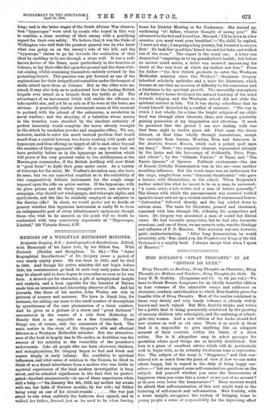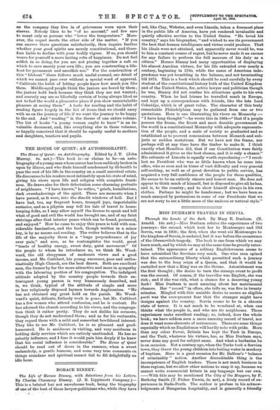on the company they live in of grievances worn upon
their sleeves. Nobody likes to be "of no account," and few care to count only as persons who "lower the temperature." More- over, the sequel meets the other side of the matter. "If you can answer these questions satisfactorily, then inquire further whether your good spirits are merely constitutional, and there- fore liable to decline with your bodily vigour. If so, you should weave for yourself a more lasting robe of happiness. Do not feel selfish in so doing, for you are not piecing together a raft on which to save merely your own life ; you are constructing a life- boat for permanent and unselfish use." For the construction of this " lifeboat " there follows much useful counsel, one detail of which we cannot pass over without a special word of approval. "Cultivate the habit of letting people know how much you like them. Middle-aged people think the juniors are bored by them ; the juniors hold back because they think they are not wanted; and scarcely any are so blissfully certain of being always liked as not to feel the world a pleasanter place if you show unmistakable pleasure at seeing them." A taste for reading and the habit of reading figure largely in the list of items that we should carry with us on the journey of life if we want the journey to be happy to the end. And " reading " i8 the theme of one entire volume. The lid of books "a young woman ought to know" is an in- valuable document, and, like everything else in these volumes, as happily conceived that it should be equally useful to mothers and daughters, teachers and pupils.
THE HOUSE OF QUIET AN AUTOBIOGRAPHY.
not, like Clay, Webster, and even Lincoln, taken a foremost place in the publics life of America, have yet rendered invaluable and quietly effective service to the United States. "He loved his country," says his biographer, "and wished to see its government the best that human intelligence and virtue could produce. That his ideals were not attained, and apparently never would be, was to him a constant source of regret, but he never made it an excuse for any failure to perform the full measure of his duty as a citizen." Horace Birmey had many opportunities of displaying his almost Aurelian virtues, for his life extended over nearly a century, beginning in 1780, while the cause of American inde- pendence was yet trembling in the balance, and not terminating till 1875. This is a book which should be read carefully by every student of the constitutional history both of the United Kingdom and of the United States, for, active lawyer and politician though he was, Mussy did not confine his attentions quite to his own country. When he had leisure he travelled much in Europe, and kept up a correspondence with friends, like the late Lord Coleridge, which is of great value. The character of this truly remarkable Philadelphian may be gathered from one or two quotations. Here is one illustrating his views on Monarchy :— "I have long thought "—he wrote this in 1864—" that if a people possess the frame, the freest and most durable government in the world is a constitutional Monarchy with adequate representa- tion of the people, and a scale of society so graduated and so established as to prevent concussions between Monarch and sub- jects or sudden mutations. Bat we have not the frame, nor perhaps will at any time have the timber to make it. I think exactly what Hamilton did, that if our Constitution were fairly administered it gives us the best chance, and it is only a chance." His estimate of Lincoln is equally worth reproducing —"I recol- lect no President who was so little blown when he came into office, who so soon and in times of vast difficulty and very general self-seeking, as well as of great devotion to public service, has acquired a very full confidence of the people for these qualities, He seems to be an entirely sincere and honest man. Ho does not appear to think much of himself, but is disposed to give all he has, and is, to the country ; and to show himself always in his own clothes. Perhaps he might be handsomer ; but we have been so much annoyed by pretensions in some of our Presidents that we are not sorry to see a little more of the undress or natural style."























































 Previous page
Previous page